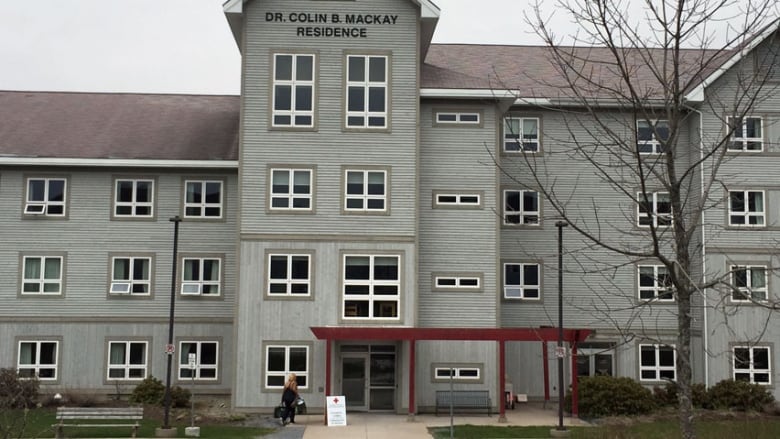Student stunned by 61% price hike in mandatory meal plan at UNB Saint John
Working the farm all summer won’t come close to paying the bills, says Garrett Oakes

Garrett Oakes, 19, says he feels blindsided by a big jump in what he'll have to pay for food while living in residence next year at the University of New Brunswick Saint John.
Last year, he paid $3,400 for a pay-as-you-go plan. That means every time he got a plate of food or a drink in the dining hall, the price was deducted from his account.
Next year, he just found out, all meal plans are converting to all-you-can eat and the cheapest option is $5,500.
That's an increase of $2,100 or 61.7 per cent.

"When I saw that, it was pretty surprising," said Oakes, speaking from his family's farm in the western New Brunswick community of Bath.
Hikes for all residence students
The university says students are being impacted by inflation plus a policy change.
The rising cost of food and labour is reflected in the new price, said Sheldon MacLeod, associate vice-provost, student affairs and services.
The university is also dropping its pay-as-you-go options, which ranged from $1,000 to $3,400.

Oakes said pay-as-you-go worked well for him.
The amount available on his plan would be loaded onto his student identification card. Every time he went to the dining hall, he'd swipe his card at the checkout and the cost of his food would be deducted. For example, one of his favourite meals, a chicken burger, would reduce his account by about $9.50.
MacLeod said the changes were driven by student feedback and are aimed at improving food security.
He said some students on the smaller plans would end up running out of food credit before the end of the session and not have the money to pay for any top-ups.

"At the end of the semester, we were having students who were either not eating as well, or they might not have access to money at the end of those semesters, when dollars get tight and the budgets are wearing thin," said MacLeod.
"So for UNB, one of the things we've done is we standardize it across the institution. So in our Fredericton campus for instance, students have enjoyed an all you care to eat plan for a very long time and been pretty happy with it."
Prices are also going up at other New Brunswick campuses.
UNB's plan on the Fredericton campus rises from $5,050 to $5,500. Other schools are also hiking their prices.
Mount Allison's all-access, unlimited meal plan climbs from $5,117 in 2022-2023 to $5,551 in 2023-2024.
St. Thomas University's "Freedom Plan" advertised as taking "away the need to budget or count meals during the week" and used by over 60 percent of the students, rises from $4,555 to $4,895 — change of $340 or seven percent.
However, STU will continue to offer less expensive options, including 14 meals per week during the academic year for $4,665 and 10 meals per week for $3,942.
Farm work won't pay the bills
Oakes said it cost him $19 342 to go to school last year, an amount he mainly cobbled together from student loans, amounting to $7,000), and scholarships and bursaries, including a $5,000 scholarship from the Brain Tumour Foundation of Canada.
"The remaining balance I paid with money saved from my pumpkins [and] squash sales and working on the farm," he said.
Oakes was diagnosed with a brain tumour at age two and then again at age six, for which he received, in total, 63 rounds of radiation therapy.
"Because of this experience, I'm pursuing an education in health care," he said. "I hope to be able to make a positive impact on sick people and their families, who may have been in situations like mine."

Oakes said he'll manage to save about $5,000 working from May until September. Tasks on the farm include picking rocks out of the field and loading potatoes onto trucks. On the hottest days, he'll have to start his chores at 5 o'clock in the morning.
"In my case, including the tuition increase for my bachelor of health and the increase for my room and the meal plan, I have to come up with an additional $3,260," Oakes said.
"That's how much money additionally I have to come up with."
"It feels daunting and unachievable. The only way I can see coming up with an additional $3,000 is by picking up a night shift elsewhere, perhaps at McCains. This on top of my day job at the farm seems unrealistic and impossible."
School's kitchenettes will be gone
UNB Saint John students who choose to live in residence are also facing fewer options when it comes to preparing their own meals.
The 19-year-old Mackay Residence used to have 85 kitchenettes shared by about 170 students.

But if renovations are completed on schedule, there will be no kitchenettes in individual residence rooms in Saint John as of September 2023.
All residents can still have a mini fridge, microwave, and kettle in their rooms if they choose and they could use the one community kitchen from about 7 a.m. to 11 p.m.
The university says it has provided help in the past to a "fair number" of students in need by covering their food costs for the last few weeks or months of school.
The school said the infinite meal plan, though more costly, should reduce that risk.

